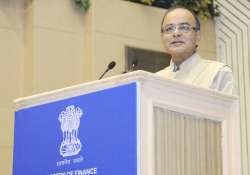EPF tax: Final stand on taxing during Budget debate, says Jaitley
New Delhi: Facing flak for proposing a tax on employee provident fund withdrawals, Finance Minister Arun Jaitley said he will spell out the final decision on the matter when he replies to the debate on

New Delhi: Facing flak for proposing a tax on employee provident fund withdrawals, Finance Minister Arun Jaitley said he will spell out the final decision on the matter when he replies to the debate on Budget in Parliament.
After Budget 2016-17 proposed taxing 60% of the withdrawal from Employee Provident Fund (EPF) on contributions to be made after April 1, the government hinted of a partial rollback.
At a meeting organised by industry chambers on Budget provisions, Jaitley said the move was aimed at high-salaried class and not the overwhelming section of 3.7 crore EPF members.
"The revenue department had considered various aspects of the National Pension Scheme and Employee Provident Fund Organisation (EPFO). Their intention is not revenue raising, that was not the principal intention," he said.
The intention behind the move is to make India more insured and pensioned society as the Budget provision provides for no tax on EPF withdrawal if it is invested in pension-based annuities.
"The EPFO has about 3.7 crore members of which about 3 crore members are those in the earning category of Rs 15,000 and below (statutory wages). For them there is no change," he said. "It is only those private sector employees who have just joined that this will impact them."
With the proposal being attacked by various employees unions including RSS-backed BMS and political parties who termed it as "an attack on the working class and a clear case of double taxation," the government said on Tuesday that the taxation will be limited to only the interest accrued.
"Now there have been some reactions. When the debate comes up in Parliament, I will give the government's response as to what decision we finally take in this matter," he said.
Jaitley said the objective behind the proposal was that no tax is levied on 40% of the withdrawal which can be used for meeting retirement commitments.
The balance, he said, can be converted into an annuity and the person would get a regular pension and he does not pay tax.
"There is also a change in the law that when inheritance comes in there is no tax payable," he said. "This was intended to incentivise people in the private sector also to use it as a kind of pension fund and to disincentive those who otherwise would indulge in the consumption of that fund this move was made."
Revenue Secretary Hasmukh Adhia said the government wants 60 percent of the withdrawals from employee provident fund to be invested in annuity pension schemes rather than the 100 percent of the money being taken home.
"40 percent we are giving you tax exempt in any case. Remaining 60 percent, we are saying, if you put in annuity there will be no tax on that. We want to create a pension security for you, it is not a revenue mobilisation effort for us. It is a pension security for you," he said
The government, he said, wants to encourage individuals to select any annuity product from anyone who gives the best.
"But still if you have compulsion that you don't want to buy annuity product, you really want to withdraw the money then it should be taxed," he said, adding that its a reform measure of the government.
World over exempt-exempt-tax (EET) is the norm and "so you encourage saving at the time of entry (by exempting it from tax) and when you hold on to the money there is no tax. But when he wants to use the money that time you tax him. That is the policy world over".